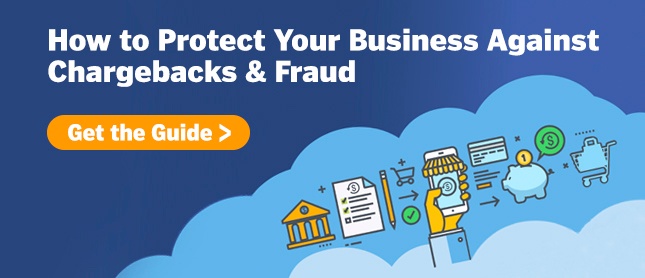
Chargeback Remediation: 4 Ways to Remedy Your Chargebacks
By Brian Radford on May 25, 2021
There are a few unfortunate facts for businesses to accept if they want to keep their customers happy and continue operating; one is the inevitability of certain costs. Yet while it's true that many expenses can't be evaded, chargebacks are one item that doesn't fall under this category. In many cases, customers file disputes for the wrong reasons or companies receive completely fraudulent chargebacks—when this happens, it's best to fight back against the charges.
Ignoring chargebacks could result in a business losing up to 40% of its revenue. Even more alarmingly, the number of chargebacks that companies receive is growing every year. According to some estimates, the number has risen 20% annually in recent years, and the cumulative impact on retailers is close to $4 billion of losses. That's not an amount any firm can afford to shrug off.
These numbers might sound exaggerated or implausible, but many people fail to realize that the cost of chargebacks goes far beyond the original value of a transaction. A true calculation also needs to account for other fees involved in bringing a good or service to the market, including shipping and business operations—plus additional chargeback fees. All in all, the cost of a chargeback can end up being around two to three times larger than the value of the transaction itself (for example, a $10 sale would cost a business $25 after the chargeback).
Even worse, if a merchant fails to get their chargebacks under control, their payment processors could hit them with substantial fees—or, in more extreme circumstances, blacklist them altogether. This would be enough to usher in collapse for most businesses, so it's simply not worth the risk.
The only appropriate response to chargebacks is to tackle them directly and imminently. Honest retailers that accurately describe their products or services and deliver them with prompt, high-quality service don't deserve to go out of business due to fraudulent or unfair disputes. Instead, they should pursue chargeback remediation.
Find Out What’s Causing Your Chargebacks
Before retailers even begin to think about preventing and tackling chargebacks, they need to understand why they appear in the first place. For a customer to file a dispute, they need to justify it to the card network, making it easier for retailers to trace back to the root cause of a chargeback. Although consumers sometimes make unfair claims, it's often the case that something is wrong with a firm's policies, processes, or practices.
These explanations are captured as reason codes. It might seem overwhelming to understand and interpret these codes since there are so many of them, but retailers can't afford to skip this process—reason codes give valuable clues for preventing and tackling both present and future chargebacks.
To fight a chargeback successfully, retailers need to provide substantial evidence to prove that the dispute was illegitimate and should therefore be reversed. Without this, chargeback representation will most likely fail, resulting in time and resources being wasted for nothing—and making the cost of chargebacks even higher. This is why reason codes are so important.
Plus, once retailers understand why their customers are filing chargebacks, they can put prevention strategies in place. Effective strategies should be tailored to a retailer's specific needs and issues—for instance, delivering items more quickly is useless if chargebacks are primarily filed due to transaction errors.
Why Doing Nothing Isn’t an Option
Although it might feel that way sometimes, the sole purpose of chargebacks isn't to make retailers' lives miserable. They exist to prevent consumers from falling victim to fraud or unscrupulous merchants and, therefore boost their confidence when making transactions (especially when shopping online).
Unfortunately, the system is easy to abuse: fraudsters understand exactly how to use chargebacks to their advantage. Even some consumers realize that it's easier to file chargeback than to go through a retailer's refund process. To fight these unfair disputes and look after their business, merchants must go through a process called representment, which involves giving evidence to prove a transaction was legitimate and they did nothing wrong.
The consequences of skipping representment can be disastrous:
-
Lower revenue. The more chargebacks a merchant receives, the harder it will hit their revenue and profits. Eventually, this could drive them out of business altogether.
-
Open to fraud. Even if a retailer can stomach the costs associated with chargebacks, it's hard to feel comfortable with them after realizing the money was lost at the hands of fraud. Plus, fraudsters do a good job of spotting businesses that won't fight against their dishonest practices, so turning a blind eye will only make the problem worse. Some estimates suggest those who carry out one friendly fraud charge successfully will attempt the same thing at least two times more.
-
Fees and penalties. Since 2018, retailers have been required by law to acknowledge every chargeback they receive. Failing to accept or dispute the charges results in a penalty worth $2 to $10 per dispute, in addition to the usual chargeback costs.
4 Chargeback Remediation Options
Retailers have four options when remedying chargebacks, which fall under two categories: preventing them from being filed in the first place and contesting them through representment once they've already been processed. Here's a summary of how each one works.
Fight Chargebacks
If a merchant decides to fight against a chargeback, they must go through the process of representment to reverse it. This effectively involves "presenting" the evidence a second time (hence the name) to prove that the reason for the chargeback was illegitimate. It's not always possible for retailers to fight disputes, even if a chargeback was unfair, since they may have insufficient proof—but in the case of friendly fraud or high-value transactions, representment is always worth trying.
Deflect Chargebacks
Transactions involve not just the merchant and the customer, but also their banks—resolving disputes is therefore a complex process that needs to go through all these parties. Fortunately, some services allow all parties to collaborate, making resolution quicker and easier.
Prevent Chargebacks
By the time a retailer realizes they received a chargeback, there's little they can do about it. However, some services give merchants real-time alerts ahead of time for a small cost, giving them a window of opportunity where they can take action. After receiving alerts, retailers can provide customers with a refund, which reverses the dispute. This might not seem like an ideal option since it means merchants lose the sale value, but it saves on the additional costs associated with chargebacks and helps protect merchant accounts from being shut down.
Verifi and Ethoca both offer alert services, and Verifi also has a Rapid Dispute Resolution (RDR) feature that responds to alerts automatically. However, it's preferable to go with an authorized reseller instead to receive maximum coverage and avoid paying twice for the same alerts.
Hire a Chargeback Management Company
Carrying out the processes outlined above is no small task, and firms with smaller teams often struggle to handle everything themselves. But there's a simple solution: chargeback management firms can take on responsibilities like analyzing data, monitoring and resolving alerts, simplifying fighting disputes, and more. This encompasses prevention, deflection, and representment. It's possible to work with a firm that only focuses on one or two aspects of chargeback management, but getting everything done by the same company ensures a smooth, reliable process with minimal communication errors.
Chargeback Remediation You Can Rely On
Chargeback remediation can be a tough process for merchants to navigate. Fighting them means knowing which ones you can fight and how to fight them, and then overseeing that whole process from start to finish. To prevent them from happening in the first place, you have to know why you're getting them, and that means analyzing large amounts of chargeback data.
Very few merchants have the time or resources to become chargeback defense experts on top of doing everything else they need to do to stay competitive in today's marketplace. That's where outsourcing chargeback services and having the right management software that can automatically and intelligently handle your chargeback-related tasks can be such a great help.
MidMetrics provides all of the essential chargeback services (discussed above)—along with a full suite of our own proprietary chargeback management tools, including Management Dashboards, In-Depth Analytics Tools, and On-Demand Reports. This gives you a comprehensive platform for fighting chargebacks and defending your merchant accounts, all for one price.
How much would it cost to cobble all these services together from different providers—and how effective would they be? MidMetrics is expertly designed to be easy to use, easy to integrate with your existing systems, and robust enough to provide actionable insights for every merchant's chargeback situation.
Want to see MidMetrics in action? Book a demo with one of our chargeback specialists today.
A solid chargeback protection plan is essential, but what is a good chargeback protection? What components does it need to have, and how can you tell if they’re working effectively? We’ve got answers for you in this helpful guide, How to Protect Your Business Against Chargebacks & Fraud.
Chargeback Protection, Chargeback Prevention, Chargeback Representment



